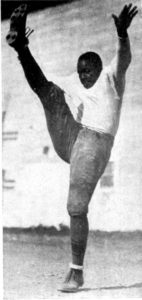
Joe Lillard
*Joe Lillard was born on this date in 1905. He was a Black professional athlete (primarily) an American football player.
From Tulsa, OK, Lillard came to Mason City, Iowa, in 1915 at the age of ten, following the death of his parents. Mrs. Walter White adopted him, but during high school lived with two relatives, Herbert and Horace Spencer, brothers who owned a sidewalk paving company in Mason City. Joseph Lillard graduated from Mason City High School in 1927.
Nicknamed the (Midnight Express) he went to College at the University of Oregon. While there, he played for the school's freshman team in 1930. The following year, he appeared in two games for the varsity team. Against Idaho, Lillard was responsible for all of Oregon's points in a 9–0 Ducks win. In the season's second game, the Ducks upset Washington 13–0; Lillard had a touchdown and intercepted two passes. Lillard was ruled ineligible by the Pacific Coast Conference for reportedly having "played semi-professional baseball] under an assumed name."
He played professional baseball and football and was an original Savoy Big Five basketball team member that eventually became known as the Harlem Globetrotters. As a professional athlete, he was among the first ten Black men to play in the National Football League. He played during the Great Depression with the Chicago Cardinals, and while there was their legitimate superstar. As a tailback in 1932 and 1933, Lillard was an outstanding rusher, kick returner, and kicker.
He ran for 494 yards in 171 rushing attempts in his two-year NFL career. In 1933, the Cardinals posted 52 points in 11 games; between rushing, passing, kicking, and a punt return for a touchdown, Lillard played a role in 31 of the team's points. That season, Lillard was involved in a fight in a game against the Cincinnati Reds; after being punched by Cincinnati's Lester Caywood following a successful field goal attempt, he responded by punching Caywood back. Following the 1933 season, Lillard did not play again in the NFL.
He was one of only two Black players in the NFL at the time, making him a marked man in the race-conscious league. Coach Paul Schissler would later say that opponents would "give Joe the works," forcing him to take Lillard out of the game. Still, despite such actions, Lillard led an otherwise hapless Chicago team. Lillard raced fifty yards against the Bears at Wrigley Field for a score, leaving Hall of Famers "Red" Grange and Bill Hewitt in the dust. After he left, the Cardinal’s Lillard played for the Brown Bombers. They were an all-black team founded in the summer of 1935 by Herschel "Rip" Day, a Black athletic promoter in Harlem.
Lillard remained a football player for several years, competing in minor leagues. Later in his life, he moved to Astoria, Queens, working at an appliance store and for Vinn Sporting Goods. Lillard had a stroke and was afflicted with agnosia as a result; he died in New York City's Bellevue Hospital Center on September 18, 1978.
Jay Barry interview with Fritz Pollard,
July 1970, in the Brown University Archives;
New York Amsterdam News,
August 31, and September 21 and 28, 1935;
New York Age, October 26, 1935.